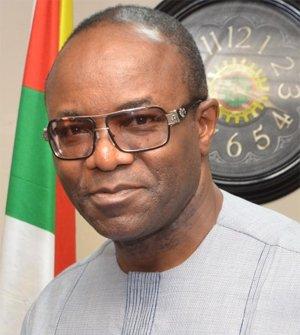


Petroleum sector reforms: I don’t have the magic wand – Kachikwu

The newly appointed Minister of State for Petroleum Resources, Mr. Ibe Kachikwu, Wednesday, stated that he does not have the magic wand to turn around the fortunes of the oil and gas sector, but will work with other stakeholders and will place emphasis on finding more oil, finding more gas, monetizing these resources and putting money in the hands of the Federal Government.
Kachikwu also stated that the current fuel crisis witnessed across the country would end in the next few days, as the Nigerian National Petroleum Corporation, NNPC, has increased its fuel supply by about 4,000 truckloads in the last three days, as against 2,500 truckloads per day in the past days.
Speaking on assumption of office in Abuja, after his inauguration by President Muhammadu Buhari , Kachikwu said, “I do not have the magic wand. I might have some good ideas, but those ideas will have to come from all of us and all of us will have to buy into it.”
He disclosed that prominence will be placed on growing income, cutting costs and in helping the federation stabilize, noting that these steps are necessary guide to the direction his administration is headed.
Kachikwu, who also stated that he will continue in office as the Group Managing Director of the Nigerian National Petroleum Corporation, NNPC, added that the country presently has products to meet 22 to 23 days of fuel demand, while he assured that the outstanding subsidy payments approved by the President would soon be paid to oil marketers immediately the government gets the approval of the National Assembly.
He assured staff of the Petroleum Ministry and parastatals under the ministry of an inclusive and conducive working environment.
He said, “One thing is certain, and we can be sure of whichever time I spend here, it is going to be spent with a lot of respect for the dignity of people. I am a very respectful person and I give as much as I expect to have. So you wouldn’t have anybody treating you with some level of disrespect.”
Kachikwu further stated that though he will respect civil service processes and systems inherent in the Ministry Of Petroleum Resources, but he will challenge the processes to ensure they are effective, while executives of the various parastatals would be engaged with to see if they have the capacity and ability to deliver the change mantra.
He said, “We will let the MDs of various parastatals work with us to understand what the agenda of this administration is. But fairly quickly, we will be able to sit down and see if they have the capacity to deliver those results. I want to put that on the table. I am not saying I am going to change people, but we would absolutely require them to show an ability to deliver the sort of change mantra that we are looking for.”
Contiuning, he said, “I like to respect processes and systems. There are reasons why the civil service processes are in place. I will challenge those processes to change and be fast and not to crawl, but I will not go outside the system. I don’t do that. I also respect hierarchy.
“The second thing is that we have dwindling resources and yet the whole nation depends on this ministry to provide the resources. So, we must be able to begin to put on the cap on how do we cut cost? How do we improve on earnings, how do we meet federation account requirements? How do we put controls that are essential to prevent leakages? How do we develop new income streams? How do we develop investments?”
He also stated that the Federal Government will focus on tackling environmental issues so that oil producing communities do not feel left behind and their environment destroyed.
On the issue of the Petroleum Industry Bill, PIB, he said, “Government believes in PIB still. Government wants to see the PIB come through. However, Government has indicated that there is a need to look at the PIB as was submitted to the sixth assembly and try and tinker with it.
“They are all kinds of issues; one of those is whether we need to yank out the fiscal terms and develop them into a different law relying on existing laws or amend those, or whether we do that as a separate component of law.
“I have having dialogue with the senate, who are moving fairly fast in some analysis of this. But key is engagement. What made the previous one fail was that a lot of sectors did not feel they were sufficiently engaged.
“I think that one of the things that the senate is actually is doing is to make us co-own the Bill so that we spent the energy that is required to do the seed work of engagement and amendment so that we all have a Bill that we are all not going to fight about in the national Assembly, but one that have everyone wrap their hands around.”
Source: Vanguard
Share this post
Naijanetwork Forum Statistics
Threads: 14843,
Posts: 17902,
Members: 6711


